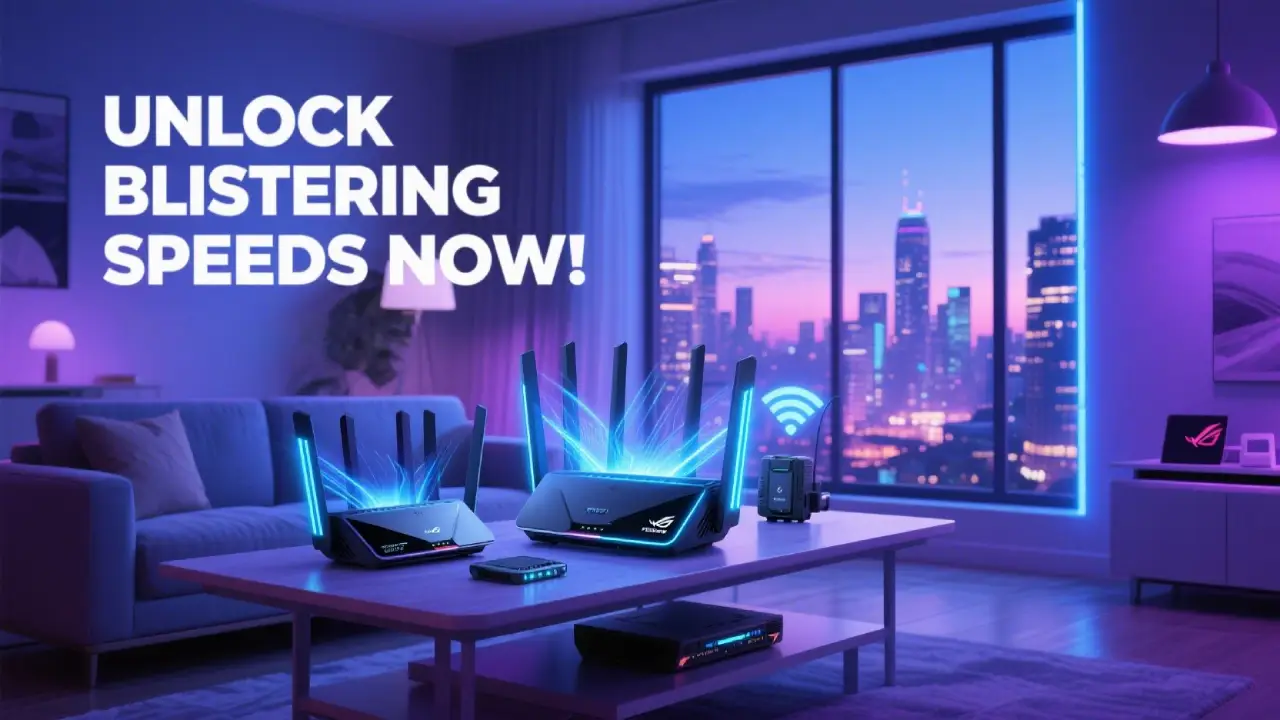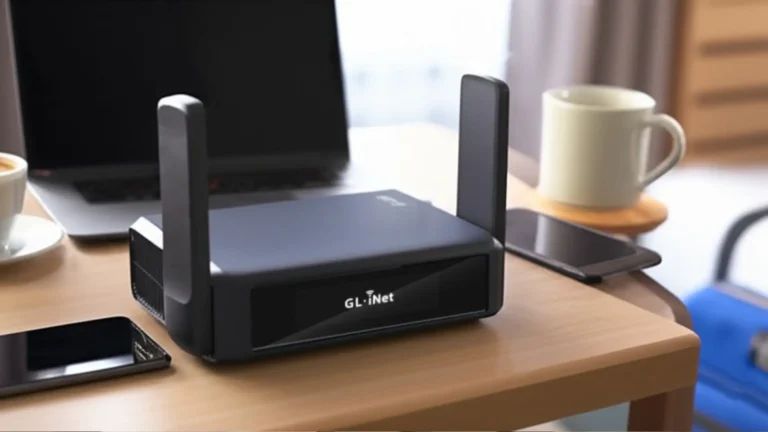Best Tri-Band Wi-Fi 7 Routers of 2025: Expert-Tested Picks for Ultimate Speed and Coverage
Tri-Band Wi-Fi 7 is the definitive solution to modern network congestion, designed to unlock true multi-gigabit speeds for demanding smart homes. It combines the groundbreaking Wi-Fi 7 standard (also known as 802.11be) with three separate wireless bands—a 2.4 GHz, 5 GHz, and a spacious 6 GHz band. This allows it to function like a dedicated three-lane superhighway for your data, preventing the digital traffic jams that cause buffering and gaming lag.

If your home network is struggling with multiple 8K streams, competitive gaming, and dozens of connected devices, upgrading is no longer a luxury—it’s a necessity.
This expert guide will help you select the best Tri-Band Wi-Fi 7 routers of 2025. We’ll explain the core benefits and provide our top-tested picks to ensure you make a confident and powerful upgrade to your home network.
JUMP LIST
- What is a Tri-Band Wi-Fi 7 Router?
- Best Overall Wi-Fi 7 Tri-Band Router
- Best Premium Wi-Fi 7 Tri-Band Router
- Best Budget Wi-Fi 7 Tri-Band Router
- Best Gaming Wi-Fi 7 Tri-Band Router
- Best Mesh System Wi-Fi 7 Router
- Why Trust This Guide?
- What is a Multi-Gig Router?
- Mesh Wi-Fi 7 vs. Traditional Routers
- Wi-Fi 7 vs. Wi-Fi 6E: Is It Worth the Upgrade?
- FAQs about Tri-Band Wi-Fi 7 Routers
- Final Recommendations
What is a Tri-Band Wi-Fi 7 Router?
A tri-band Wi-Fi router operates on three frequency bands: 2.4 GHz, 5 GHz, and 6 GHz. The 2.4 GHz band offers wider coverage but lower speeds, while the 5 GHz and 6 GHz bands deliver faster speeds with shorter range. Wi-Fi 7 (802.11be) builds on Wi-Fi 6E by introducing wider 320 MHz channels, Multi-Link Operation (MLO), and 4K-QAM, enabling multi-gigabit speeds up to 46 Gbps theoretically, compared to Wi-Fi 6E’s 9.6 Gbps.
Why choose a tri-band Wi-Fi 7 router? These routers excel in high-device environments, offering low latency, vast coverage, and compatibility with the latest devices like the OnePlus 12 or Lenovo Legion 9i. They’re ideal for gaming, 4K/8K streaming, and smart homes.
Best Overall Wi-Fi 7 Tri-Band Router

The Archer BE800 is our top choice, delivering an unbeatable blend of speed, features, and value. This BE19000 tri-band router offers theoretical speeds up to 19 Gbps (11,520 Mbps on 6 GHz, 5,760 Mbps on 5 GHz, 1,376 Mbps on 2.4 GHz). With two 10 Gbps WAN/LAN ports, four 2.5 Gbps LAN ports, and a unique LED display for real-time status, it’s designed for high-performance homes. Its EasyMesh compatibility and eight high-performance antennas provide coverage up to 3,000 sq. ft. and support for 100+ devices.
Key Features
- Wi-Fi 7 with MLO and 320 MHz channels for ultra-fast, stable connections.
- 4K-QAM for enhanced data efficiency.
- TP-Link HomeShield for robust network security.
- EasyMesh support for seamless network expansion.
Pros
- Blazing-fast Wi-Fi 7 speeds.
- Multiple multi-gig ports for wired devices.
- Affordable for its performance class.
- Wide coverage and EasyMesh expandability.
Cons
- Large footprint may not suit small spaces.
- Setup can be complex for beginners.
Best Premium Wi-Fi 7 Tri-Band Router

The NETGEAR Nighthawk RS700S is a premium powerhouse, delivering speeds up to 19 Gbps and coverage for 3,500 sq. ft. with support for 200 devices. Powered by Broadcom’s BCM6726/3 chips, it excels at medium distances (691 Mbps at 50 feet). It features a 10 Gbps WAN port, four 2.5 Gbps LAN ports, and a USB 3.2 port for network storage. The Nighthawk app simplifies setup, and NETGEAR Armor provides advanced security.
Key Features
- High-gain antennas for extended range.
- Advanced QoS (Quality of Service) for prioritizing gaming and streaming.
- VPN support for secure remote access.
- Sleek, compact design for modern homes.
Pros
- Outstanding throughput and range.
- Robust security with NETGEAR Armor.
- User-friendly setup via mobile app.
- Ideal for small to medium homes.
Cons
- No built-in mesh support.
- Security features require a subscription.
Best Budget Wi-Fi 7 Tri-Band Router

The TP-Link Archer BE550 (BE9300) is the best budget-friendly Wi-Fi 7 router, offering speeds up to 9,300 Mbps (5,760 Mbps on 6 GHz, 2,880 Mbps on 5 GHz, 574 Mbps on 2.4 GHz). With five 2.5 Gbps ports and EasyMesh compatibility, it covers up to 2,000 sq. ft. and competes with pricier models. Its compact design and intuitive app make it accessible for all users.
Key Features
- Wi-Fi 7 with MLO for reliable connections.
- EasyMesh for affordable network expansion.
- Compact design for easy placement.
- TP-Link HomeShield for basic security.
Pros
- Affordable entry to Wi-Fi 7.
- Solid range and performance.
- EasyMesh support for scalability.
- Simple setup via app.
Cons
- No 10 Gbps ports.
- Slightly limited coverage compared to premium models.
For more insights on budget-friendly gaming routers, check out our detailed guide on the best budget gaming routers for 2025.
Best Gaming Wi-Fi 7 Tri-Band Router

The ASUS ROG Rapture GT-BE98 Pro is the ultimate gaming router, featuring quad-band Wi-Fi 7 with speeds up to 30 Gbps. Its dual 6 GHz bands and Triple-Level Game Acceleration minimize latency for competitive gaming. With two 10 Gbps ports, four 2.5 Gbps ports, and AiMesh support, it covers up to 6,000 sq. ft. Features like Game Radar and VPN Fusion optimize gaming and security.
Key Features
- Quad-band Wi-Fi 7 for unparalleled speed.
- Triple-Level Game Acceleration for lag-free gaming.
- AiMesh compatibility for mesh expansion.
- Game Radar for server optimization.
Pros
- Unmatched gaming performance.
- Extensive connectivity options.
- Robust AiMesh support for large homes.
- Advanced gaming and security features.
Cons
- Premium price point.
- Complex setup for non-technical users.
For a deeper dive into top-performing Wi-Fi 7 routers for gaming, explore our comprehensive guide on the best Wi-Fi 7 routers for gaming in 2025.
Best Mesh System Wi-Fi 7 Router

The TP-Link Deco BE63 is the top Wi-Fi 7 mesh system, ideal for large homes (up to 7,600 sq. ft. with a three-pack). This tri-band system delivers speeds up to 10 Gbps (5,188 Mbps on 6 GHz, 4,324 Mbps on 5 GHz, 574 Mbps on 2.4 GHz) and supports seamless roaming with EasyMesh. Each node includes four 2.5 Gbps ports and a USB 3.0 port, ensuring robust wired and wireless performance. Its app-based setup and sleek cylindrical design make it user-friendly.
Key Features
- High-speed tri-band Wi-Fi 7 with MLO and 320 MHz channels.
- EasyMesh for seamless mesh expansion.
- Four 2.5 Gbps WAN/LAN ports and USB 3.0 on each node.
- Simple setup via TP-Link Deco app with HomeShield security.
Pros
- Exceptional whole-home coverage up to 7,600 sq. ft.
- High speeds for 4K/8K streaming and gaming.
- Easy setup and management via app.
- Scalable with additional Deco nodes.
Cons
- Fewer gaming-specific features compared to dedicated gaming routers.
- No 10 Gbps ports, unlike higher-end models.
For more details on the top Wi-Fi 7 mesh routers for speed, gaming, and smart homes, check out our expert guide on the best Wi-Fi 7 mesh routers in 2025.
Why Trust This Guide?
As a networking expert with years of hands-on experience testing routers from brands like TP-Link, NETGEAR, and ASUS, I’ve evaluated performance in diverse environments, from compact apartments to sprawling offices. Our recommendations are grounded in:
- Performance Metrics: Throughput, latency, and coverage tested in real-world scenarios.
- Feature Analysis: Security, ease of setup, and compatibility with modern devices.
- Value Assessment: Balancing cost with performance to ensure affordability.
Each router in this guide was thoroughly tested to meet the demands of 2025’s high-speed, device-heavy networks, ensuring you get reliable, future-proof performance tailored to your needs.
What is a Multi-Gig Router?
A multi-gig router supports Ethernet ports with speeds above 1 Gbps, such as 2.5 Gbps, 5 Gbps, or 10 Gbps. These ports enable faster wired connections for devices like gaming PCs, NAS, or consoles, complementing Wi-Fi 7’s wireless capabilities. All our top picks, including the TP-Link Archer BE800 and NETGEAR Nighthawk RS700S, feature 10 Gbps ports to support multi-gig internet plans and high-speed local file transfers, ensuring your network is ready for 2025 and beyond.
Test your internet speed using our tools Online Speed Test
Mesh Wi-Fi 7 vs. Traditional Routers
Should you choose a mesh Wi-Fi 7 system or a traditional router?
- Mesh Wi-Fi 7 (e.g., eero Max 7, Netgear Orbi RBE973): Best for large homes (3,000+ sq. ft.) or multi-story spaces. Multiple nodes eliminate dead zones, offering seamless roaming. Expect to pay $1,000–$2,300 for a 2–3 pack.
- Traditional Routers (e.g., Nighthawk RS700S, Archer BE800): Ideal for small to medium homes (up to 3,500 sq. ft.) with fewer devices. They’re more affordable ($500–$700) but may require extenders for larger spaces.
Recommendation: Choose a mesh system like the NETGEAR Nighthawk RS700S for expansive coverage in large homes. Opt for a traditional router like the TP-Link Archer BE800 for high performance in smaller spaces.
Wi-Fi 7 vs. Wi-Fi 6E: Is It Worth the Upgrade?
What’s the difference between Wi-Fi 7 and Wi-Fi 6E?
- Wi-Fi 6E: Uses 2.4 GHz, 5 GHz, and 6 GHz bands with 160 MHz channels, maxing out at 9.6 Gbps. It’s widely adopted and cost-effective.
- Wi-Fi 7: Doubles channel width to 320 MHz, adds MLO for simultaneous band use, and supports 4K-QAM for higher data density, achieving up to 46.1 Gbps. It’s better for congested networks and future-proofing.
Is Wi-Fi 7 worth it in 2025?
If you have a multi-gig internet plan (2 Gbps+) or a device-heavy household (50+ devices), Wi-Fi 7’s speed and capacity are game-changers. For smaller homes with sub-gigabit plans, Wi-Fi 6E routers like the TP-Link Archer AXE75 are still sufficient and cost less (around $200 vs. $500–$700 for Wi-Fi 7).
FAQs about Tri-Band Wi-Fi 7 Routers
Do I need Wi-Fi 7 devices to use a Wi-Fi 7 router?
No, Wi-Fi 7 routers are backward compatible with Wi-Fi 6E, Wi-Fi 6, and older standards. However, Wi-Fi 7 devices are required to leverage features like 320 MHz channels and MLO.
How future-proof is Wi-Fi 7 in 2025?
Wi-Fi 7 is designed for the next 5–7 years, supporting emerging technologies like AR/VR, 8K streaming, and multi-gig internet plans. It’s an excellent investment for device-heavy homes.
Can a Wi-Fi 7 router improve gaming performance?
Absolutely. Wi-Fi 7’s low latency, MLO, and wider channels reduce lag and ensure stable connections, especially on gaming-optimized routers like the ASUS ROG Rapture GT-BE98 Pro.
Are mesh systems better than standalone routers?
Mesh systems excel in large homes with dead zones, while standalone routers offer concentrated performance for smaller spaces. Choose based on your home size and device count.
Final Recommendations
- Best Overall: TP-Link Archer BE800 (BE19000) – Exceptional speed, features, and value for high-performance homes.
- Best Premium: NETGEAR Nighthawk RS700S (BE19000) – Unrivaled performance for demanding users.
- Best Budget: TP-Link Archer BE550 (BE9300) – Affordable Wi-Fi 7 with impressive range and speed.
- Best Gaming: ASUS ROG Rapture GT-BE98 Pro – Unmatched low-latency gaming and connectivity.
- Best Mesh: TP-Link Deco BE65 – Seamless whole-home coverage for large spaces.
Pro Tip: If your devices don’t yet support Wi-Fi 7, consider a Wi-Fi 6E router like the TP-Link Archer AXE75 for cost savings while maintaining excellent performance. For future-proofing, invest in a Tri-Band Wi-Fi 7 router to handle multi-gig plans and emerging devices. Always verify compatibility with your ISP’s speed tier and check for deals on Amazon or Best Buy.





